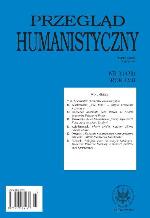Symbolika zamieci w literaturze rosyjskiej - od Puszkina do Sorokina
The Symbolic of Snow Storm in Russian Literature - from Pushkin to Sorokin
Author(s): Alicja Wołodźko-ButkiewiczSubject(s): Cultural Essay, Political Essay, Societal Essay
Published by: Wydawnictwa Uniwersytetu Warszawskiego
Summary/Abstract: THE SYMBOLIC OF SNOW STORM IN RUSSIAN LITERATURE – FROM PUSHKIN TO SOROKIN Summary Winter landscape, and in particular the vision of the snow storm, is one of the most popular topoi in Russian literature. Many authors, including Lev Tolstoi, called their works Symbolika zamieci w literaturze rosyjskiej – od Puszkina do Sorokina 13 Blizzard. In this article the symbolic meaning of this vision was presented, based on both poetic, prose and drama material, from the Demons of Alexander Pushkin, his The Captain’s Daughter and a short story The Blizzard, through the poetry of Ivan Bunin, Alexander Blok, Andrey Bely, Maximilian Woloshin, Boris Pasternak, the fiction by Mikhail Bulgakov and Boris Pilnyak, up until Vladimir Sorokin’s The Blizzard (2010). This element, related to Russia’s severe climate and her vast spaces, were perceived by many of these authors (Pushkin included) as a symbol of anarchic power incomprehensible to the West, proper to their own country; the power both fascinating and dangerous, evoked by the “demons”, the evil spirits. The symbolists (Bely, Blok) prayed to the anthropomorphic snow storm, treating it as one of the symbols of both “eternal feminity” and their own country. In the literature of the 1920s the snow storm was a symbol of revolutionary terror (among many others, such as the Flood or the fire). Dead Russia covered with snow, above which the blizzards celebrate the funeral rites: this symbol was also popular among the Russian émigrés. In the postmodern novel by Vladimir Sorokin The Blizzard (2010), referring this time to the classic tradition (Lev Tolstoi and Anton Chekhov in particular), the snow storm and its tragic results also symbolize the Russian idea and give a pessimist prognosis of Russia’s future ways as well as an opportunity of a metaphysical and political discourse regarding the role played by Russian people and intelligentsia. Trans. M. Bucholc
Journal: Przegląd Humanistyczny
- Issue Year: 435/2011
- Issue No: 04
- Page Range: 3-15
- Page Count: 11
- Language: Polish
- Content File-PDF

